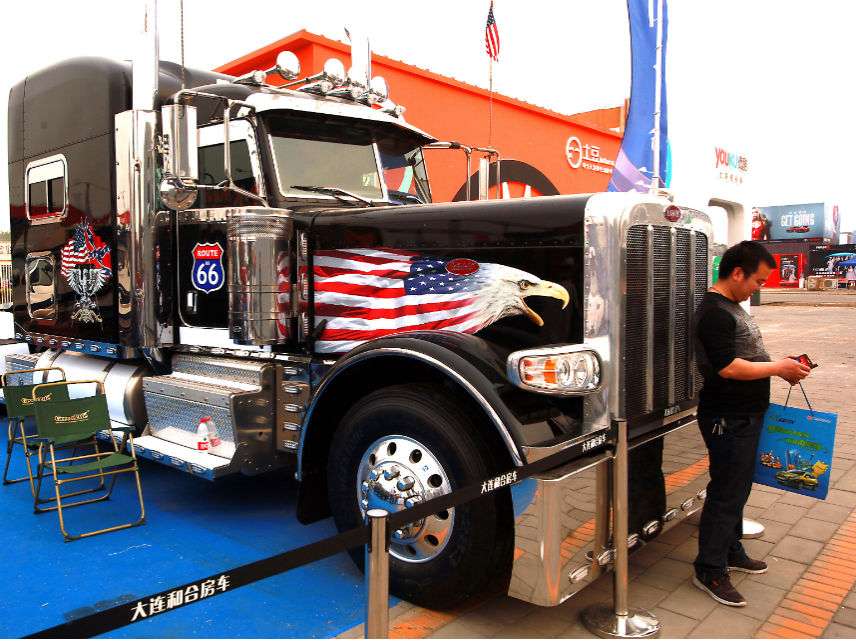Trump's NAFTA Antics Will Drive America's Auto Industry Into a Ditch
With friends like Trump, U.S. car makers don't need enemies.
The North American Free Trade Agreement (NAFTA) survived another round of negotiations between the United States, Canada, and Mexico last week, but

the Trump administration's unreasonable demands on rules of origin for the auto sector threaten to run the successful 24-year-old agreement off the road.
President Trump has been bashing NAFTA for years, describing it during the 2016 campaign as "the worst trade deal ever." He came into office promising to either radically overhaul the agreement to better favor American companies and workers or to terminate it entirely.
In a sixth round of negotiations last week in Montreal, the president's like-minded U.S. Trade Representative Robert Lighthizer pressed a key U.S. demand that Canada and Mexico agree to revise the agreement's rules of origin to require more U.S. content in vehicles that qualify for duty-free treatment under NAFTA.
Under current rules, for a motor vehicle to enter the United States duty-free from Canada or Mexico, at least 62.5 percent of its content must originate in the three North American countries. In a misguided effort to boost U.S. auto production, the Trump administration is demanding that the rules be changed to require 85 percent NAFTA content, with 50 percent from the United States.
Such a demand would be protectionist in its impact, severing North American auto producers from their global supply chains, ultimately making U.S.-based automakers less competitive in global markets, reducing their sales, production, and employment.
The current 62.5-percent requirement is relatively strict already by global standards. It was the result of a compromise when NAFTA was being negotiated in the early 1990s. The U.S. auto sector—back then essentially Ford, GM, and Chrysler—demanded a minimum content requirement of 60 percent. Canada wanted no higher than 60 percent and Mexico wanted 65, so the three parties split the difference.
By all objective measures, NAFTA is working well, for the U.S. economy and the U.S. automotive sector. In 2017, U.S.-based automakers produced 11.1 million cars and light trucks. That number has not declined since NAFTA was enacted in 1994, and is in fact above the average annual output of 10.9 million assemblies during the past 30 years. Real U.S. output of motor vehicles and parts, adjusted for inflation and quality, is up 85 percent since the passage of NAFTA, according the Federal Reserve Board.
Because of NAFTA, domestic U.S. automakers have been able to deploy their supply chain across North America, creating lower-value vehicles and parts in Mexico while concentrating higher-end production here in the United States. The result has been a U.S. auto sector that is able to deliver more affordable and higher quality cars and trucks to American families while competing more effectively in global export markets. In recent years, U.S. exports of motor vehicles have topped 2 million for the first time.
Tightening the rules of origin or, even worse, scrapping NAFTA entirely would put those competitive gains in jeopardy. "We are a seamless manufacturing platform, and it would be extremely difficult to unwind that," noted John Bozzella, CEO of the Association of Global Automakers, at a forum last year. "You will create a big advantage for other manufacturing platforms around the world. We have to be very careful that we don't upset that balance between global competitiveness and supporting U.S. production."
It's not even clear that imposing the higher rules of origin demanded by the Trump administration would support U.S. production. If the content rules become onerous, vehicle and parts producers in Canada and Mexico may decide to skip NAFTA qualification and simply pay the normal 2.5 percent car duty the United States assesses on most-favored-nation imports. Cars imported outside of NAFTA, from Canada and Mexico and countries outside North America, would almost certainly contain less U.S. content than those now produced within NAFTA.
Unlike the Trump trade team, the negotiating teams from Canada and Mexico have put forth reasonable proposals that would build on the success of NAFTA. In the most recently concluded round, Canada proposed that content rules be expanded to include expenses for engineering, research and development and other high-value-added services that are essential to producing cars but are not counted in the current rules on North American content. Mexico welcomed the proposal as "innovative"; USTR Lighthizer rejected it out of hand.
What's fascinating about the Trump administration's negotiating position on NAFTA is how little support it has received from the domestic industries it is supposedly championing. The Detroit Three automakers have made it clear that they are content with the existing NAFTA-content rules. The administration's agenda is also opposed by the foreign-owned auto manufacturers that operate affiliates in the United States, which now make nearly half of the cars built by American workers in the United States each year.
NAFTA can certainly be updated and modernized, for the auto sector and for trade generally. The almost quarter-century-old agreement needs chapters on digital commerce and state-owned enterprises, and better protections for intellectual property. (Those are all features, by the way, that were contained in the Trans-Pacific Partnership trade agreement that the United States, Canada, and Mexico all signed during the late stages of the Obama administration but that President Trump scrapped upon entering office.)
As for the core of NAFTA, which is zero tariffs on all goods trade among all three of the North American economies, the agreement has proven a boon for the U.S. automobile industry. By trying to grab the wheel and force an unwelcome change in the rules of origin, the Trump administration risks running a well-tuned and competitive U.S. industry into the ditch.


Show Comments (28)